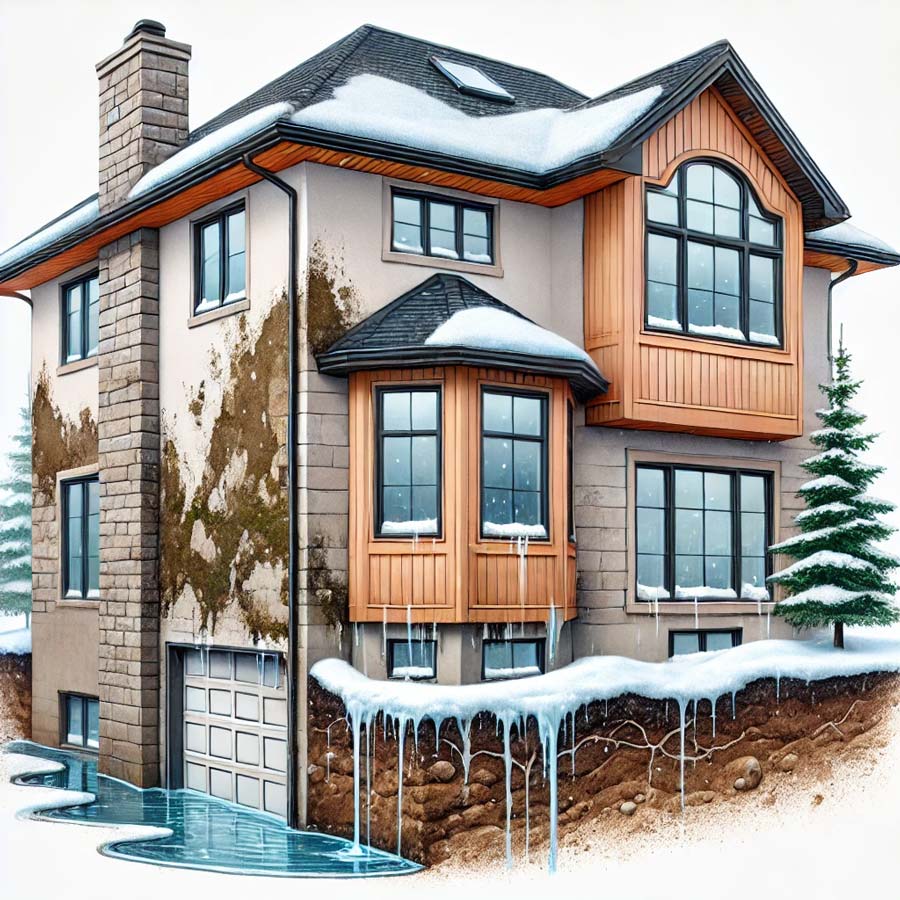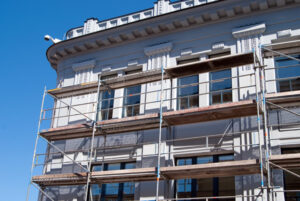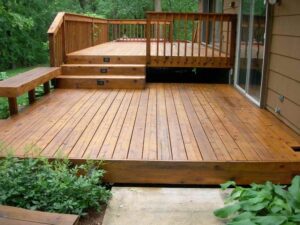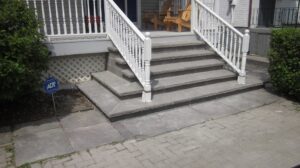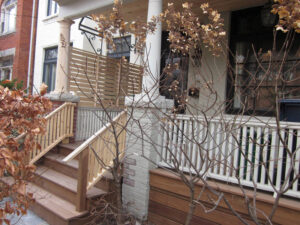Homeowners in Toronto know the city’s weather can be tough on houses. Rain and snow can lead to unnoticed water damage. Spotting early signs is key to protecting your home with basement waterproofing.
We will explore the main signs that show your house might need waterproofing. This could mean a damp basement or water marks on walls. Knowing these signs keeps your home safe and spares you expensive repairs later. Waterproofing in Toronto is more than just safety; it’s an investment in your home’s future and comfort.
Key Takeaways
- Early detection of water damage is crucial for minimizing its impact.
- Effective basement waterproofing solutions prevent costly future repairs.
- Home waterproofing in Toronto is essential due to the local climate.
- Understanding the signs of water damage protects your investment.
- Preventative actions can maintain a home’s structural and aesthetic value.
Identifying the Risk: Recognizing Water Damage
Water damage in your home can show up in many ways. Each one points to a problem that needs quick action. Spotting these early signs of water damage can prevent bigger, more expensive fixes later. Let’s look at the key signs.
Discoloration and Staining
Stains or discoloration on walls, ceilings, and floors are often the first clues. These can be yellowish-brown spots or clear water marks. They happen because of leaks or past moisture problems. If ignored, they can damage your home’s structure and lead to health risks.
Mold and Mildew Infestation
Mold in your home is not only ugly but also unhealthy. It grows in wet places like bathrooms and basements. Spotting signs of water damage and identifying mold in home can stop many health issues. Mold looks like black, green, or white patches and spreads without moisture control.
Peeling Wallpaper or Bubbling Paint
Moisture damage can also make wallpaper peel or paint bubble. This means moisture is in your walls, hurting the glue and surfaces. Even minor changes should be checked to avoid bigger problems.
Finding and fixing these issues quickly keeps your home safe and comfortable.
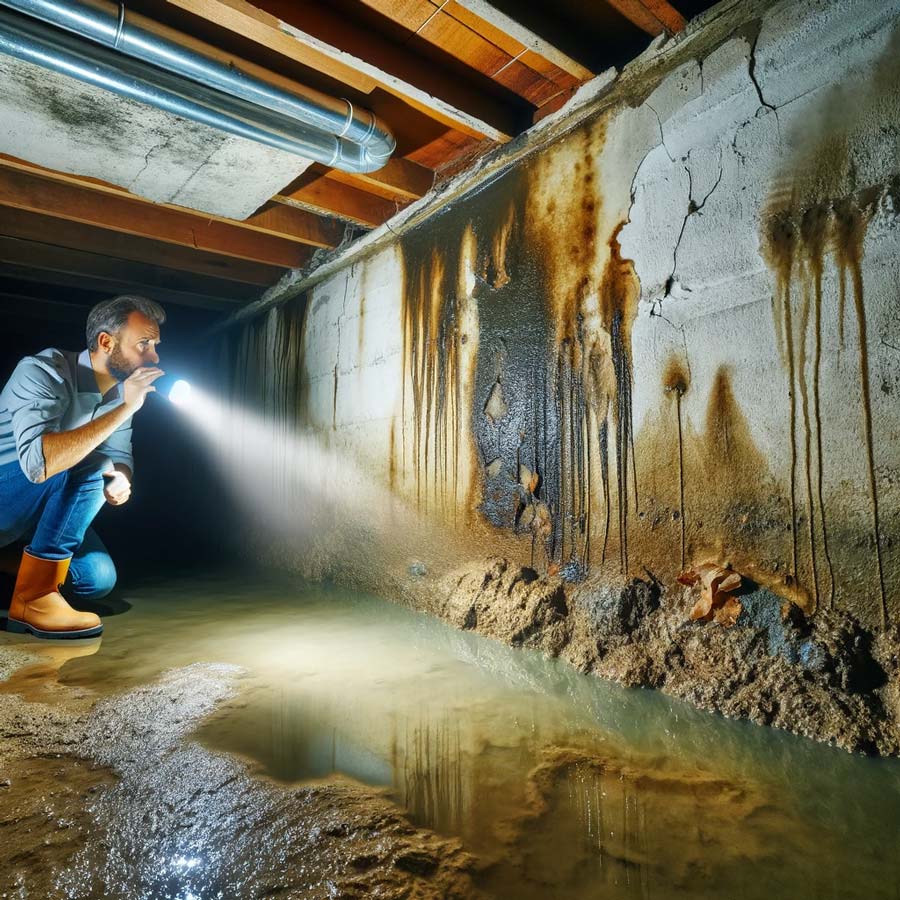
Understanding Foundation Waterproofing and Its Importance
Foundation waterproofing is key for keeping homes sturdy, especially in places like Toronto where the weather can be tough. Structural waterproofing stops water from getting into the foundation. This keeps many issues like wet or leaky basements at bay.
By using strong foundation repair and waterproofing, you protect the foundation from water harm. This also keeps your home dry and healthy. Benefits of waterproofing go beyond avoiding water damage. They also boost your home’s lasting strength and its market value.
- Prevents mold and mildew growth, which are common in moist areas and can cause health issues.
- Reduces the chance of structural harm, saving money on future foundation repair costs.
- Enhances the comfort and usability of spaces like basements or cellars.
Looking at the benefits, it’s clear why good foundation repair and upkeep matter. Homeowners should check their foundation often. Think about getting professional structural waterproofing services to keep your home safe.
Evaluating Your Basement: Is It a Leaky Culprit?
It’s key to check your basement for signs that could lead to water damage. By spotting moisture and using basement waterproofing methods, you can shield your home. Let’s explore common signs that call for immediate action and ways to fix them.
Water Pooling and Puddles
Finding water in your basement clearly points to a leak. To spot leaks, look for puddles after it rains or snow melts. These issues often stem from poor drainage or foundation waterproofing problems.
Cracks in Basement Floors and Walls
Visible basement cracks weaken your home’s structure and indicate water entry. Watching how these cracks grow can show how serious the moisture problem is.
Efflorescence on Concrete Surfaces
Efflorescence is a powdery white layer that shows up on concrete. It signals water evaporation inside the concrete. This issue points to moisture in your basement, possibly needing a reassessment of your basement waterproofing methods.
- Regular inspection of basement floors and walls for any signs of moisture or damage.
- Immediate action to seal any cracks and address efflorescence with the appropriate waterproofing treatments.
- Consideration of professional assessments if the problems persist or worsen.
Quickly dealing with these issues can greatly reduce the risk of damage from basement leaks. This ensures your home stays dry and safe.
Exterior Waterproofing: Evaluating the Outside of Your Home
In Canada, the changing seasons mean it’s vital to have good external waterproofing. This ensures your home stays dry and solid. Things like landscape grading and drainage are key to protecting your home’s outer layer.
Proper Drainage and Landscaping
Too much water near your home can cause damage. It’s important to see how water moves on your property. By grading your landscape well, water flows away from your home. This stops the foundation from getting damaged. Here’s what you can do:
- Install structured drainage systems around the house with sloped grading.
- Choose water-resistant plants and place them smartly to suck up extra moisture.
- Keep gutters and downspouts clean to ensure water flows away from your house.
Visual Signs of Damage on Exterior Walls
Your home’s exterior walls are its first protection. If you see cracks or mold, it could mean your building envelope protection is failing. Fixing these problems early on helps avoid serious damage inside. It shows why it’s so important to check and maintain your walls regularly.
Saturated Soil and Water Accumulation
When soil around your home holds too much water, it’s bad news for your foundation. You need to keep an eye on moisture, especially in rainy seasons. Seeing wet ground or water pooling around your home usually means the external waterproofing isn’t working well. Improving your landscape’s grading can help solve this.
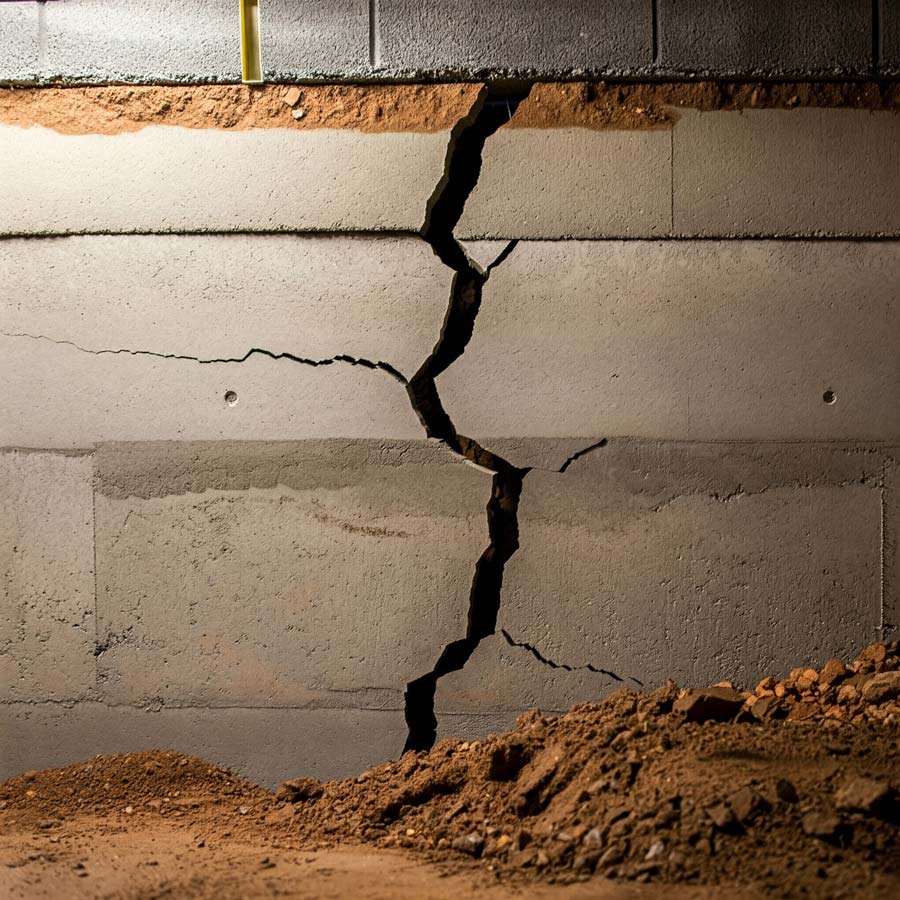
The Hidden Warning Signs: Internal Red Flags
It’s vital to watch for internal water damage to protect your home. Internal signs, often less noticeable than external ones, can help avoid big repair costs. This bit talks about hidden leaks and detecting moisture inside walls, showing ways to keep your home safe from water harm.
Finding hidden water damage calls for careful observation and sometimes pro gear. Yet, you can spot several signs yourself that suggest moisture problems in your home’s walls.
- Musty odours: Consistent musty smells suggest hidden moisture. These smells usually start in spots you can’t easily see, like behind drywall or under floors.
- Unexplained staining: Stains on walls or ceilings are a clear hint of moisture inside. Even if dry to touch, a discolored spot might show a leak is there.
- Warped walls or floors: Structures can buckle from soaking up too much moisture. This often happens with leaks hidden away, resulting in unnoticed water build-up.
Grasping detecting moisture inside walls goes beyond simple surface checks for homeowners. It involves spotting subtle signs before they cause big troubles. Using moisture meters and checking concealed pipes often are good moves. When problems keep up, getting a pro to look for hidden leaks is wise.
Quickly handling hidden leaks and inside damage helps maintain your home’s structure. It also cuts down health risks linked with mold and mildew, which grow in wet places. Staying ahead of such issues is crucial for a safe, healthy living space.
Professional Inspection: Getting an Expert Opinion
If you see signs of moisture or water damage, think about hiring a waterproofing expert. They can give you a deep waterproofing assessment and a professional water damage inspection. They’ll figure out how serious it is and what caused it. Knowing when to get expert help and what these assessments involve can save lots of time and money.
When to Call for a Professional Assessment
Knowing when to ask for a professional check is key. Look out for ongoing dampness, musty smells, or visible mold. These signs often mean there’s a water problem that needs an expert’s look.
- After a flood or heavy rain, even if you can’t see any damage.
- When you’re thinking about making changes to your basement or other low areas.
- If you find water stains on ceilings or walls and can’t tell where they’re from.
What to Expect During a Waterproofing Inspection
When you hire a waterproofing expert, expect them to thoroughly check everything. They will find issues you have now and might have in the future.
- Visual Examination: The expert will closely look at areas like basements, crawl spaces, and outside walls.
- Moisture Mapping: They use advanced tools to see where moisture is in your home, showing the areas with the most moisture.
- Detailed Report: After checking, you get a full report. It tells you how bad the damage is, what repairs are needed, and how much it will cost.
Dealing with minor leaks or big water problems? Getting an expert in early can stop a lot of damage and high repair costs. Keeping your place dry and safe is a smart way to look after it for the future.
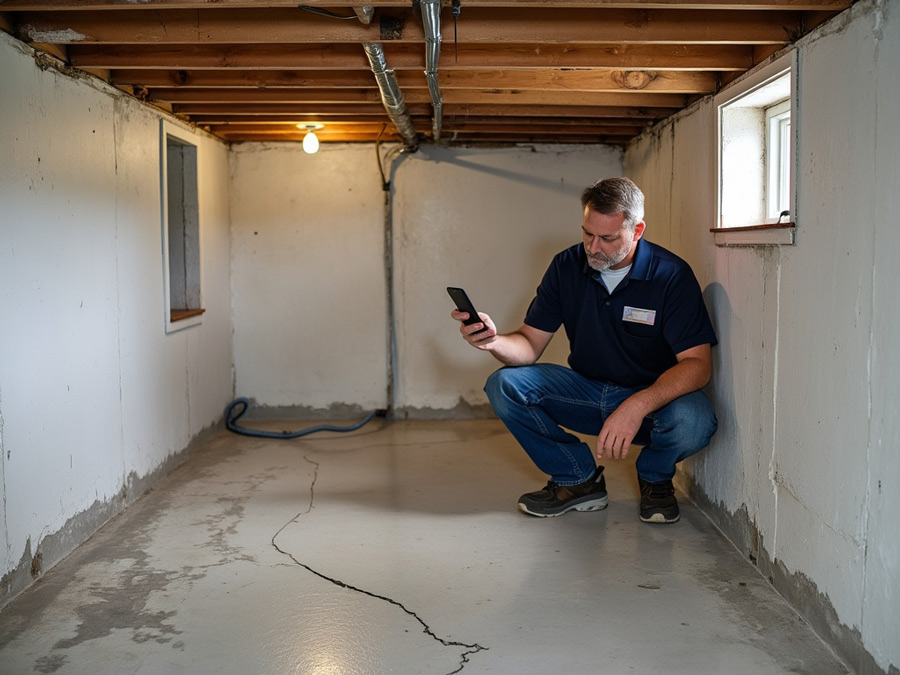
Waterproofing Toronto, Leaky Basement, Foundation Waterproofing, Wet Basement
Protecting Toronto homes from water damage is key. Many options exist to shield your home. Learning about Toronto waterproofing services is crucial for keeping your home safe over time.
Choosing the Right Waterproofing Method for Your Home
When picking waterproofing methods, you need to look at more than costs. Consider Toronto’s weather and city layout. Here are some factors to weigh:
- Area-specific climate challenges
- Type of foundation and basement construction
- Previous history of water damage
- Long-term maintenance and sustainability
Choosing the right waterproofing solution means creating a plan that fits these factors.
Why Professional Services Make a Difference
DIY fixes might seem okay for now, but pros offer lasting solutions. Professional services bring big benefits, such as:
- Insights from experts in preventing water damage
- High-quality materials and methods
- Warranties that DIY doesn’t cover
For problems like a wet basement or foundation needs, using professionals helps a lot. They make fixing water issues easier and more effective.
DIY Versus Professional Solutions: What’s Best for Your Home?
Choosing between waterproofing DIY methods and getting help from professional waterproofing contractors needs a careful cost-benefit analysis of waterproofing. Each path offers its own pros and cons, especially for Toronto homeowners facing water issues.
Going the DIY route might save money up front and is attractive for those who like to be hands-on. It allows you to manage the project on your timeline. But, there’s a risk of not applying materials correctly or missing spots, which can cause bigger problems later.
Investing in professional waterproofing contractors means bringing in expertise and guarantees, important for protecting your property over time.
To make the right choice, understand the extent of your water damage:
- A small leak might be manageable with a DIY fix.
- Widespread or structural issues will likely need a pro.
A good cost-benefit analysis for waterproofing considers future damage potential, property value, and your peace of mind. Pros offer lasting, effective solutions, which saves money and protects your investment in the long run.
In deciding on DIY versus professional waterproofing, weigh your home’s needs, your skill level, and the risks of mistakes. Choosing quality and being thorough is crucial, whether you do it yourself or hire pros. This ensures your home stays safe from water damage.
The Long-Term Advantages of a Dry and Healthy Home
Keeping your basement dry offers important benefits for your home and wallet. It’s especially crucial in places with changing weather, like Toronto. These advantages are key for anyone owning a home.
Improving Air Quality and Reducing Health Risks
A dry basement is great for keeping the air clean. It stops mold and mildew from growing. These can cause breathing problems and other health issues. Keeping the basement dry is a big step towards a healthier home. It lowers the risk of health problems for your family.
Preserving Structural Integrity and Property Value
Having a dry basement also means your home’s value goes up. It makes your home’s structure stronger. This reduces the risk of damage like wood rot and corrosion. A strong structure is safer. It also makes your home worth more if you decide to sell later.
The perks of a dry basement go beyond just fixing immediate issues. They offer important benefits for a safer, healthier home. It’s not just about preventing problems. It’s about making life better and more financially secure.
Conclusion
Looking back, the signs that you need to waterproof your home are clear. They show the importance of acting early to keep the house and your peace of mind secure. Addressing water damage, making sure the foundation is waterproof, and fixing leaks are key. It’s vital to have a strong waterproofing plan to keep your living space safe.
Leak prevention is a must-do in home care. It stops future issues and unexpected costs. Getting a professional to inspect and give advice is key. This helps homeowners understand what their house needs and make smart choices.
Waterproofing your home is about more than spending money. It helps keep the house strong for a long time and makes living there better for everyone. Knowing your home is safe from water damage brings homeowners a peace of mind that’s very valuable. To finish, keeping your home dry and healthy is always worth the effort.
FAQ
What are the top signs of water damage that indicate my home may need waterproofing?
Look out for discoloration and stains on walls and ceilings. You might also spot mold, peeling wallpaper, and bubbling paint. A musty smell is another red flag. These could mean your Toronto home needs basement waterproofing.
How can I tell if mold in my home is a sign of water damage?
Mold often shows water damage. Look for spots in different colors. It likes moist places. Finding mold or a mildewy smell suggests needing a wet basement check.
What is foundation waterproofing and why is it important?
Foundation waterproofing stops water from getting into your home’s lower areas. It’s key in Toronto to avoid water damage, protect your home’s structure, and keep the living environment healthy.
How do I evaluate my basement for signs of a leak?
Check your basement for pooled water or puddles after rain. Look for cracks and white, powdery efflorescence on concrete. This might mean you need waterproofing.
What exterior waterproofing aspects should I examine around my home?
Outside, make sure drainage and landscaping keep water from your foundation. Check walls for damage and the ground for wetness. This helps protect your home.
What are some hidden warning signs of internal water damage?
Inside, a humid feeling, high water bills, or hearing running water could mean leaks. Warm floor spots also suggest hidden leaks. Finding these early matters.
When should I call for a professional waterproofing assessment?
Call for a pro if you see water damage signs, it’s been a while, or after big weather changes. They’ll check thoroughly and suggest solutions for your home.
Why should I consider professional waterproofing services over DIY methods?
Pros in Toronto offer skills, precision, and guarantees not found in DIY. They make sure the waterproofing fits your home, protecting it long-term.
What are the long-term advantages of investing in home waterproofing?
Waterproofing boosts indoor air, cuts health risks from mold, keeps your home solid, and might up its value. It’s smart for Toronto homes, facing our weather.
